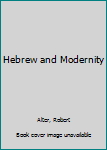Hebrew and Modernity
Select Format
Select Condition 
Book Overview
No Synopsis Available.
Format:Hardcover
Language:English
ISBN:0253304733
ISBN13:9780253304735
Release Date:March 1994
Publisher:Indiana University Press
Length:192 Pages
Customer Reviews
2 ratings
Insights into the creation of a vernacular
Published by Thriftbooks.com User , 16 years ago
Robert Alter's masterful "Hebrew and Modernity" gives vital insights into the role played in creating a Hebrew literary vernacular in the modern age. There are eleven essays here, and each one explores an aspect of the emerging Hebrew "self" in modern times, and its correlated literature. A paradigmatic example is his exploration of the life and work of the Hebrew poet David Vogel "Fogel and the Forging of a Hebrew Self." Here, Alter combs through Vogel's early diaries, to find the first stirrings of a "modern" sensibility of self expression in the Hebrew language. In one entry from 1912, Vogel claims that "My soul [then] was not flawed, and it left its imprint on all my behavior; I always knew myself, this self of mine [ha'ani sheli], and ever since I left there, I haven't known myself; I am not I" Alter thinks that here, quite rightly, is the first time the article placed in front of "I" in Hebrew is used in a discussion of the "Self" and its fundamental alientation (both from the world, and from itself; a kind of composite self which is at war with itself). David Vogel, in 1912, was tackling, perhaps for the first time in Hebrew, one of the philosophical quandaries of the twentieth century: the fractured or divided self. Examples such as this abound in Alter's volume. He is a meticulous scholar and each of his essays provides brilliant insights into the fascinating emergence of modern literary Hebrew.
Essays on modern Hebrew Literature and its antecedents
Published by Thriftbooks.com User , 20 years ago
These are the chapters of this work: Hebrew and Modernity, Secularity and the Tradition of Hebrew verse, Inventing Hebrew prose, Fogel and the Forging of a Hebrew self, The Inner Immigration of Hebrew Prose, The Israeli Novel and Post World-War II fiction , Vistas of Annihilation, A portrait of Yehuda Amichai, Agnon's Psychological Realim, Agnon's Shira, Kafka's Father Agnon's Mother, Bellow's Cousins. This is a group of illuminating essays by one of the most accomplished of Hebrew language literary critics. This is a sample of Alter's polished and insightful analysis " Agnon's Hebrew is an intricate echo chamber, constantly and deviously recapitulating the literary and theological history of the language as he deploys it. Symbolic reconfiguration of familial and other materials in his fiction is also a repeated interrogation of the values of the present through those of the past, and vice versa. Ecclesiastes and the Book of Judges , medieval Hebrew poetry and the Zohar, resonate weirdly through Israel in the age of archeological discovery, which is the setting of Edo and Enam. Of course, such a process of highly charged intertextuality is by no means unique to Hebrew, but it finds an unusually congenial medium in the long tradition of Hebrew. an urgent, often surprising dialogue between different eras , extending to the microscopic articulations of the text, was a distinctive feature of Hebrew literary expression, at least through the middle decades of this century, and even as we approach the century's end, there is at least some evidence in current Hebrew writing from the poetry of Yehuda Amichai to th avant- garde novels of Yoel Hoffman that the millenia- long dialogue is far from done. p. 188





